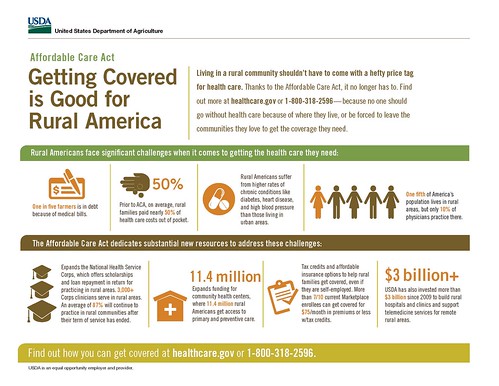
Keeping our rural communities healthy is key to building a stronger America. That’s why as we kick off this year’s Rural Health Week, I’m proud of the new affordable health insurance options that are available because of the Affordable Care Act, helping to give rural families piece of mind across the country.
Quality health care is critical to the success of rural children and families – and open enrollment for health insurance coverage only happens once each year. From now until January 31, 2016, you can sign up for an affordable plan that’s right for you and your family. If you currently have coverage, you might qualify for a plan that can save you money.
Before the ACA, many rural Americans struggled to find affordable healthcare, paying nearly half of all medical costs out of their own pockets. Many self-employed farmers, ranchers, and rural small business owners—some of the most critical contributors to strong rural economies—did not have access to the affordable insurance options that many people get through their employers. Too often, getting quality care in a rural community came with a hefty price tag. But today, more than 70% of all Marketplace enrollees can get covered for $75 a month or less with tax credits.
If you live in rural America, you're now less likely to have to go far for quality care. Since 2011, this Administration has made innumerable investments in rural health, and thanks to the ACA, Americans have better access to doctors, nurses and comprehensive prevention and wellness services close to their homes.
To improve access to reliable care, we’ve also added a variety of Medicare strategies, including the Critical Access Hospital program, aiding the expansion of rural health clinics and local community health centers. In 2014, the Rural Housing Service invested more than $176 million for assisted living and nursing home facilities through the Community Facilities program, including a new Diabetes Center for Excellence serving the St. Regis Mohawk Reservation in Akwesasne, New York. Chronic health challenges like diabetes impact tribal elders disproportionately, and this Center has helped improve the health and wellness of the Akwesasne community by providing nearby specialized services for diabetes prevention and management.
This Administration is making sure all rural Americans have a place to go for their health related needs – including mental health services. That’s why in 2013 Vice President Biden announced $100 million to increase access to mental health resources, with $50 million committed to helping over 200 community health centers establish or expand behavioral health services, and an additional $50 million to finance the construction, expansion, or improvement of mental health facilities in rural areas. These investments through the Affordable Care Act make it possible to hire new behavioral health service providers, creating jobs and increasing economic opportunity for rural professionals.
More than 7.8 million uninsured rural Americans under 65 have gained new opportunities to enroll in affordable health care in the past year, and nationwide, an estimated 17.6 million Americans have found health coverage. The ACA makes rural communities stronger and gives hardworking rural families the financial security they deserve. Financial help is available through HealthCare.gov and picking a plan and signing up for coverage is now easier than ever -- you can even enroll on a cell phone.
If you or someone you know needs health insurance, now’s the time to sign up. Find out more at HealthCare.gov or 1-800-318-2596 before January 31, 2016—because no one should go without healthcare because of where they live, or be forced to leave the communities they love to get the coverage they need.



